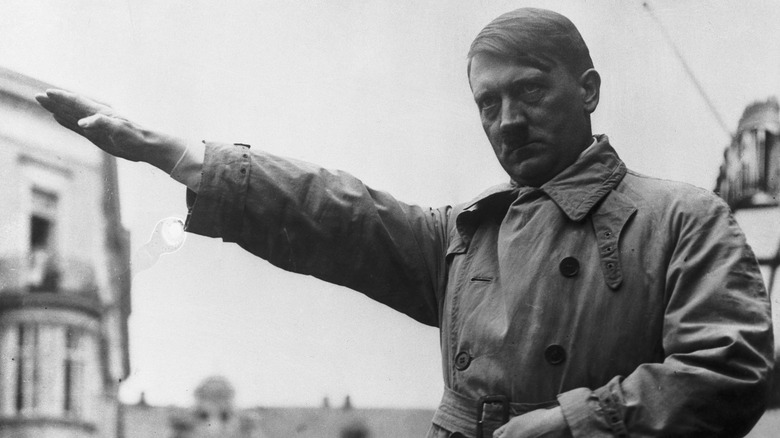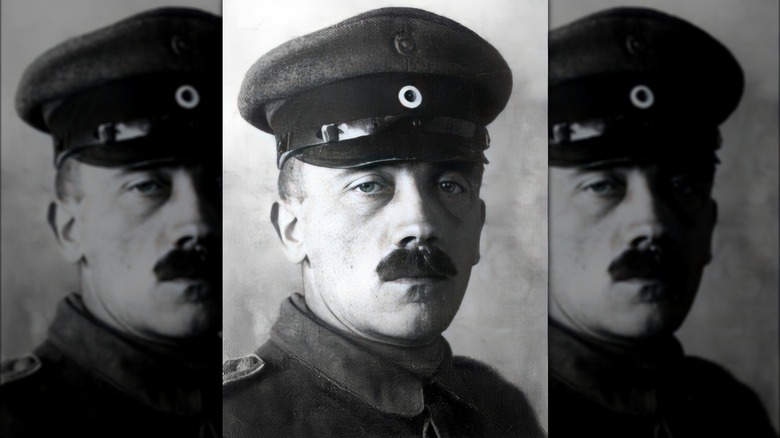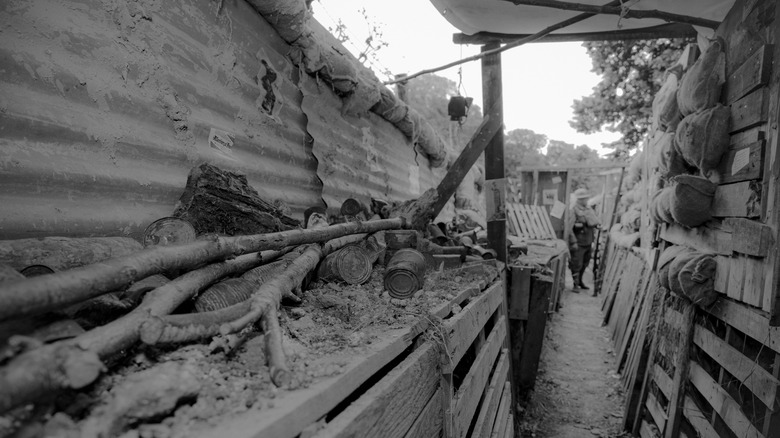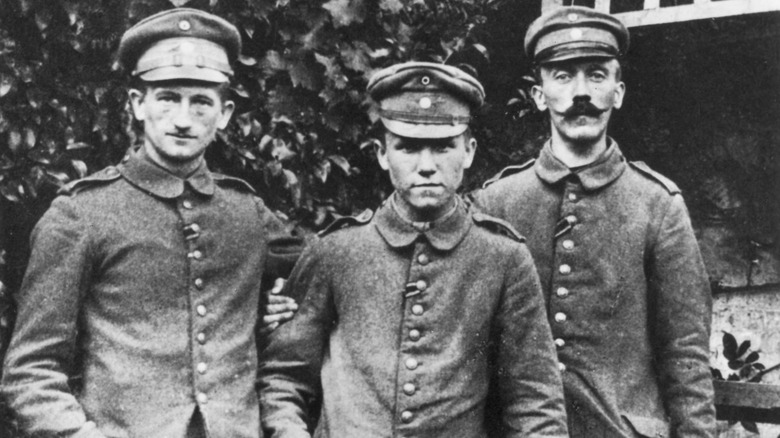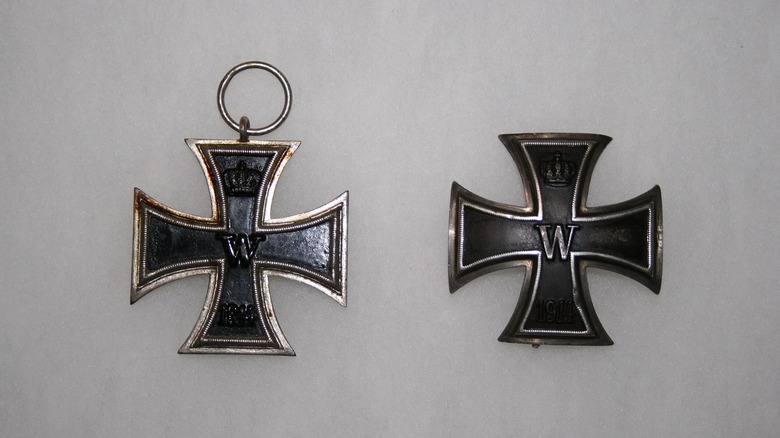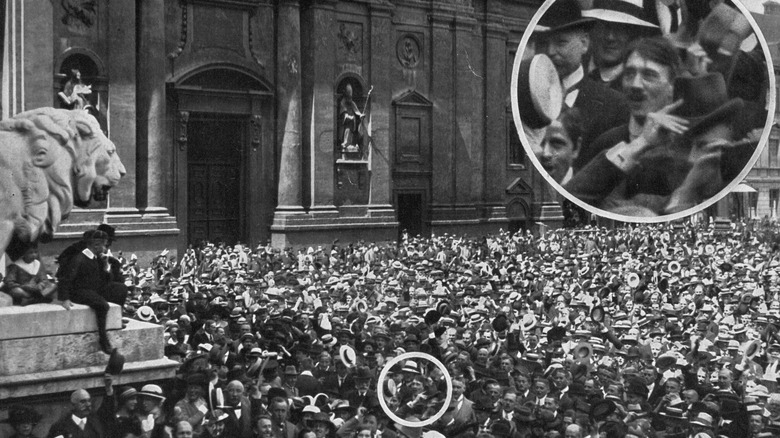What Hitler's Time In World War I Was Really Like
Adolf Hitler: mass murderer, spittle-mouthed speech giver, wearer of an unenviable mustache, and ... World War I veteran? Yep. Long before Hitler became chancellor of Germany in 1933 and rabble-roused a morally defeated and financially broken nation into getting excited about attacking the world, he was a decorated war veteran. Or he was a bumbling moron. Or he was a quiet artist who sheltered a dog named "Foxy" in the trenches. Depending on the source and its attitude, all of the above and more are true.
When World War I broke out in 1914, Hitler was essentially an art school wash-out earning a living selling paintings. He volunteered for service in the Bavarian Army in August of that year at 25 years old — six years after being denied entry to Vienna's Academy of Fine Arts for the second time. Ironically, he'd moved to Munich in 1913 to avoid authorities after not registering for the draft in Linz. Before this, he was actually drafted in 1910 but failed to report for duty.
And yet, Hitler wound up volunteering for service. As biographer Volker Ullrich wrote in "Hitler:Ascent," his military physical exam declared him "unsuitable for combat and support duty, too weak, incapable of firing weapons." He was also an odd person who lacked "leadership qualities," per Heritage of the Great War. But, he apparently excelled in his job as a runner delivering messages across the battlefield, which twice earned him Germany's Iron Cross. Ultimately, Hitler's experiences in World War I helped shape him into the dictator we remember.
Hitler's introduction to war
Throughout this article it's important to bear in mind that objectivity is difficult with a historical person like Adolf Hitler. It could feel uncomfortable to think of him as a brave war figure, or anything but a monstrous maniac. Some sources openly mock him and refute the truth of his wartime experiences based on moral grounds related to his later actions. But no matter your perspective, it's crucial to see how Hitler as a young man in his 20s transformed through his military service into dictator of Germany.
Hitler, aka private No. 148 in the 1st Company, 16th Bavarian Reserve Infantry Regiment, reported for duty in 1914 happy as a lark. During basic training fellow soldier Hans Mend described the future führer gazing at his rifle "with delight, as a woman looks at her jewelry," per Warfare History Network. In just over two-and-a-half months Hitler and his regiment went from green novices at Oberweisenfeld Barracks to frontline combatants on October 25 during the months-long Battle of Ypres. The conflict progressed into close-quarters combat that saw him jumping into British trenches. At one point a bomb reportedly went off and killed the man next to Hitler, but only tore Hitler's sleeve — the first time of many that he survived through luck.
In the end, over 10% of German soldiers died in the battle. In recognition of Hitler's actions his regimental commander, Lieutenant Colonel Philipp Engelhardt, referred him to headquarters as a runner to deliver messages across battlefields.
[Featured image by Unknown, AI image processing: Madelgarius via Wikimedia Commons | Cropped and scaled | CC BY-SA 4.0]
Battlefield messenger turned soldier savior
Author Iain B. King describes Adolf Hitler's role as messenger as a "cushy position ... several miles behind the frontline ... in relative safety and luxury." Other sites like Warfare History Network say the exact opposite — that being a runner was "not a cushy job but a highly dangerous responsibility" that entailed racing around a live battlefield amidst bullets and explosions, jumping in and out of trenches and holes made my artillery shells while delivering messages to specific people at specific locations. At the age of 27, Hitler himself wrote that he ran "in the eye of an almost certain death and pelted by shell-fire on every meter of the road," per Heritage of the Great War.
Hitler underwent two critical experiences from November 3 to December 2 that not only gave his military career a boost, but his ego too. Both instances, interestingly enough, involved him saving the life of the regiment commander that had made him a runner, Lt. Col. Philipp Engelhardt. In one instance Hitler and his fellow soldier Balthasar Brandymayer dragged the injured Engelhardt to safety in the middle of combat, and in another both men stepped in front of their leader to shield him from danger. For these actions Hitler was promoted to the rank of corporal, and on December 2, 1914 he received the Iron Cross, 2nd Class. In a letter to his former landlord he called it "the happiest day of my life," per the Anne Frank House.
Twisted by combat, loss, and resentment
Even early in his military career Adolf Hitler's fellow soldiers thought he was odd. He kept to himself and read or painted for enjoyment. The one time he received a package from the outside world — baked goods from a baker in Munich — he wrote back and told the man to never write him again. Hitler didn't drink or party, and called out his fellow soldiers for showing attention to women, especially non-German women. And yet, Hitler reportedly treated prisoners of war with respect and attended funerals for enemy soldiers. He was also known as uncannily fearless. The few friends that Hitler made died one by one, leaving him with his closest companion "Foxy," a dog he adopted after it showed up in German trenches.
The first two years of Hitler's military passed this way until October 6, 1916, when shrapnel tore into his leg. Hospitalized, away from the frontlines and amongst civilians, he brooded and grew resentful, and was stunned by how orderly everything was. His moralistic streak twisted into disgust of anything "impure," and we get the first inklings of his future anti-Semitism when he complained that "every clerk was a Jew and every Jew a clerk," as Warfare History Network quotes. Hitler was eager to get back into combat, and in fact never wanted to leave. When he was first injured he asked, "How bad is it? I don't have to go, have I?," per Heritage of the Great War.
More awards and temporary blindness
If Adolf Hitler's first two years in the military and subsequent hospitalization set the stage for his future beliefs, then those beliefs started becoming apparent when he got released from the hospital. In March 1917 Hitler rejoined his regiment (and dog). By April 1918 over half of that regiment had gotten killed. His dog Foxy vanished during this time, as well, along with his set of paints. Speaking of Foxy, Hitler wrote, "The swine who took him from me doesn't know what he did to me," per Warfare History Network. Meanwhile, Hitler's antisemitism grew more vocal, and his behavior more mercurial. One anecdote describes him getting into a fistfight with a soldier who was talking smack about Germany, while another recounts him chasing rats with his bayonet at night in his barracks.
It was during this time that Hitler earned two more medals and had another brush with death. In September 1917 he earned the Cross of Merit 3rd Class with Swords for overall "valorous service," per Warfare History Network. The following year, in July 1918, he dragged another officer to safety and won another Iron Cross — this time 1st Class. A couple months later he got caught in a gas attack. His mask didn't shield him from the strike, and he got shipped to a hospital again, temporarily blinded. It was there that Hitler received the news that the war was coming to an end the next day on November 11 after the emperor fled Germany. He was shocked at the news and experienced psychosomatic blindness for a week.
[Featured image by Gary Todd via Wikimedia Commons | Cropped and scaled | CC0 1.0 UNIVERSAL]
The makings of a dictator
All in all, what we know of Adolf Hitler's time in the military portrays a young man predisposed to extreme ideas and intense feelings fueled by his World War I experiences. His hospitalization in 1916 seemed to leave him with a strong distaste for Jewish people and what he saw as Jewish corruption of Germany. After World War I ended Hitler joined the German Workers' Party in 1919, and as the United States Holocaust Memorial says, wrote for the first time that year about the "race-tuberculosis of the peoples." "[The] ultimate goal," he said, "must definitely be the removal of the Jews altogether." Fourteen years later Hitler was German chancellor.
Looking at the bare facts of Hitler's military record, he served a total of 45 active months across 36 battles. There are no records of him ever taking a life in combat. Most of his former combat buddies kept silent about him after he came to power. One that didn't — the aforementioned Hans Mend who commented on Hitler loving his rifle — vanished. Some claim that several of the more unusual incidences of his career — like him getting blinded by chlorine gas — were invented after-the-fact as Nazi propaganda. And while it's true that the Nazi Party built a cult of personality around Hitler that all but deified the man, we can at least see in his wartime personality a lethal cocktail of determined and spiteful, confident but fragile — precisely the ingredients needed to make a tyrant.
